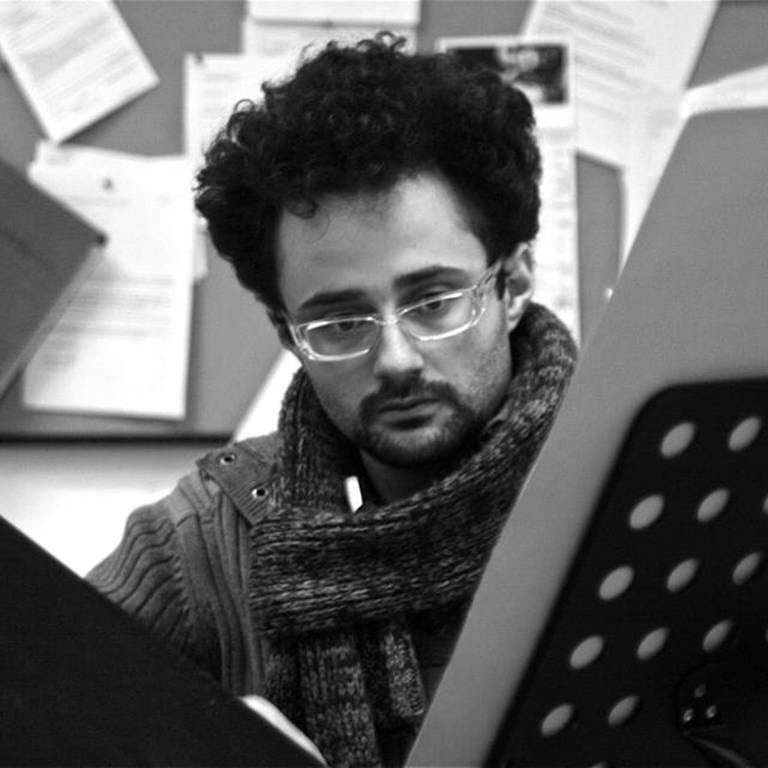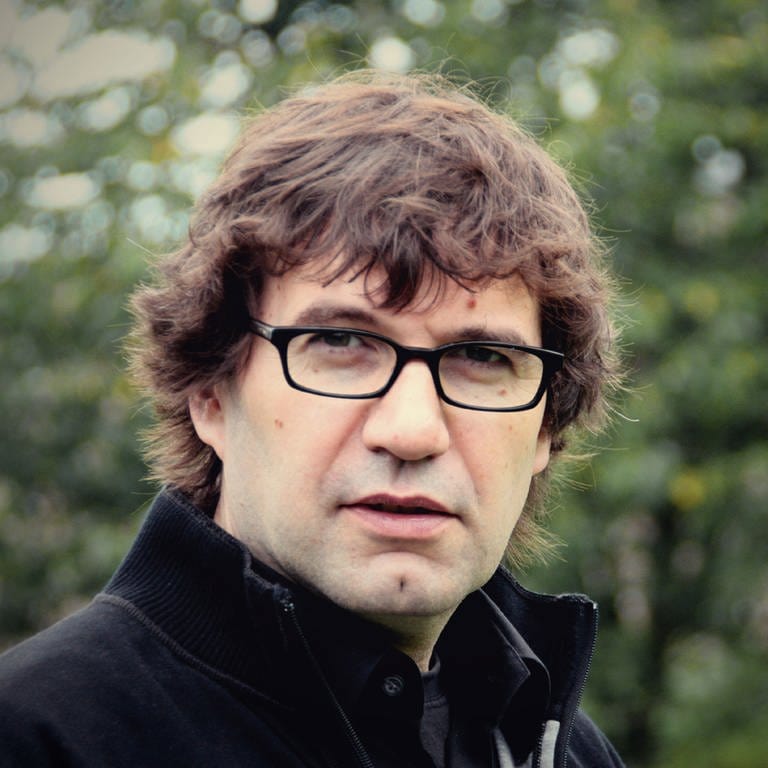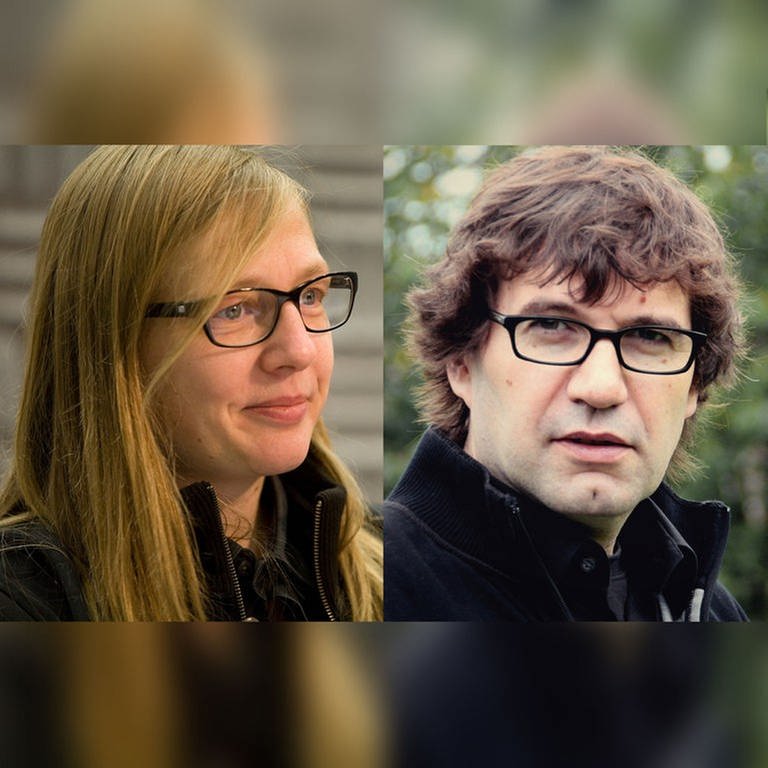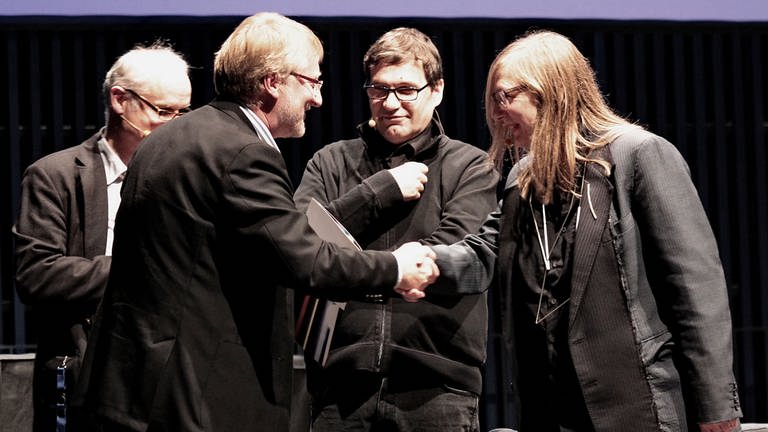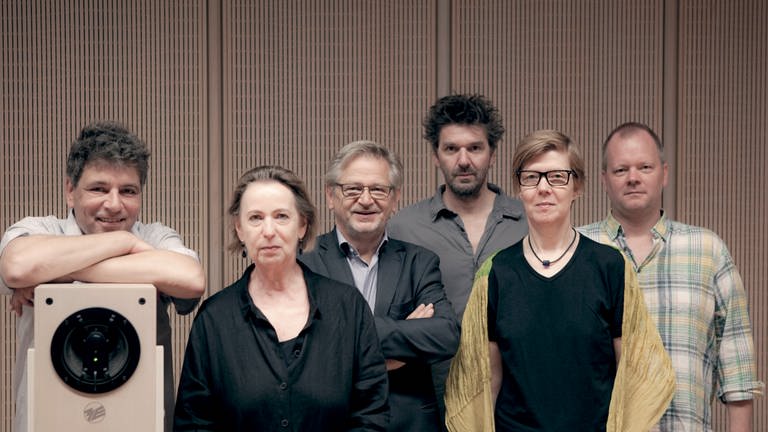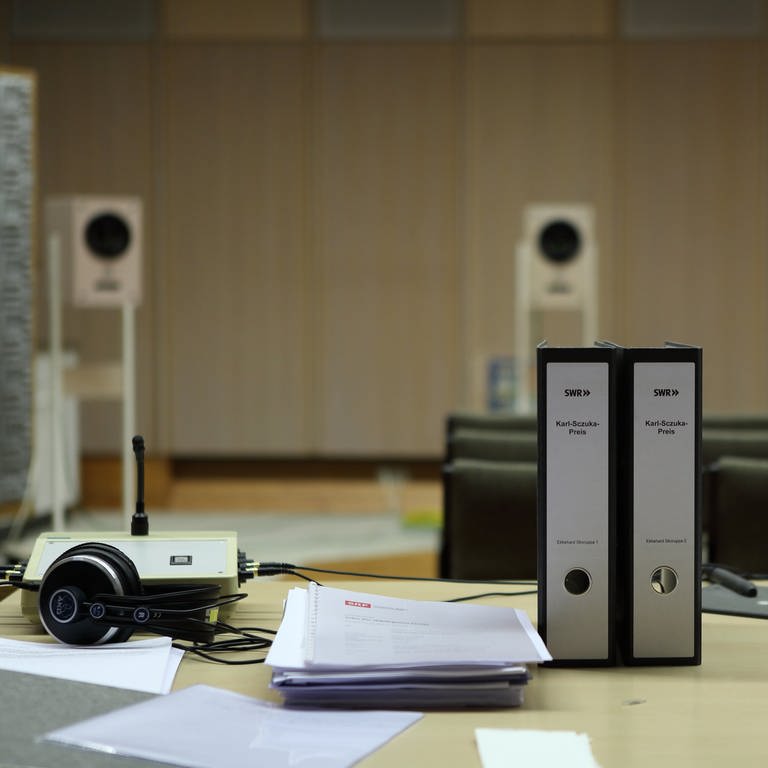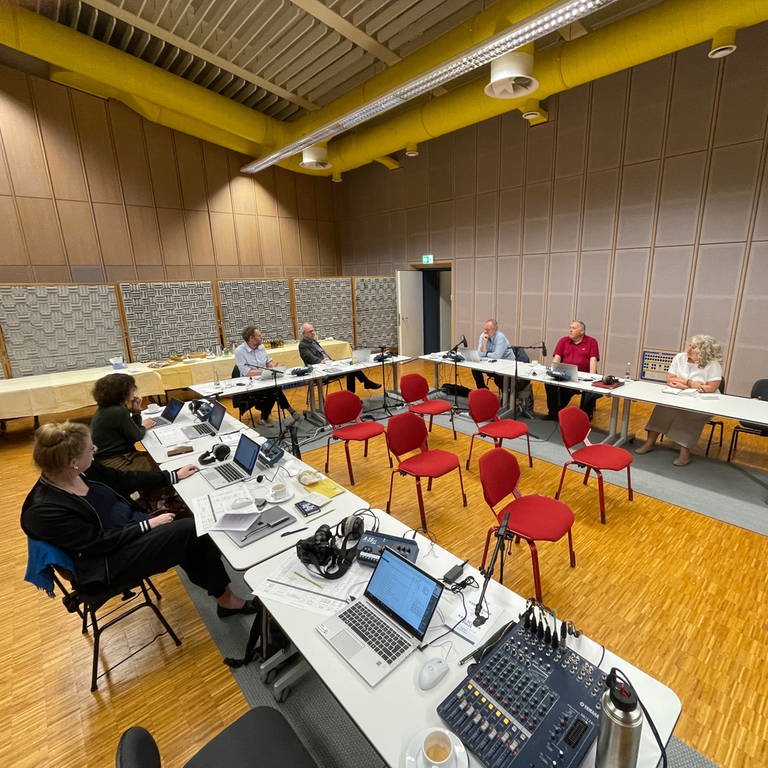Oswald Egger's poetic radio play centers around the work and life of J.M.R. Lenz during his time in Moscow in 1781/82.
Oswald Egger on his work
The Livonian Jakob Michael Reinhold Lenz (1751-1792) grew up in a bilingual area; the place itself bore two names: Dorpat (German) and its anagram: Tarbot (Livonian). One speaks fluently: Latvian, Estonian, and - brokenly - German. Accordingly, in the play, three equally coexisting states come together, converging into language, in mutually (frequent) overlapping, (incessantly) intermittent and (continuously) iterative, (meanwhile) receding and (harmoniously) reabsorbing periods, oscillating phases, and often whimsically alternating unrest and pitch.
Like a terrain pockmarked with hummocks and hollows, with windswept ridges and knobby, almost gravelly drumlins, inversion hummocks, and word-moths, like gnomes gray rock, rock faces, and scars: all angular, rift, and erratic forms, interspersed with Latvian loanwords in Livonian, Estonian phrased flint dances and songs made of punched-out words forgotten by the world, both absolutely emerge and appear. What they say or self-forgetfully do, but would not remember a thing about it, not meanwhile - circumstances occasionally everywhere: is that the piece? One?
Even the Baltic areal-linguistic language disunity forms, connects, and shapes the areal zones of its wind-sedimented landscape, where words (like flowers) bloom from the dunes and drift (pieces, like clouds, plucked from the air), patchy word fragments in Latvian and Estonian in the meantime: The assimilated German poet Lenz learns to speak ("language of airy spirits") on the seething ground of a non-German foundation, structured by abrasions and splinter-syllables shattered sentence-word-couplings and word-set-forked syntactic webs.
An "Areal Abecedarium in Livonian-German wording"*, i.e., Livonian-German words from the late Lenz's lifetime as well as the suffix-less sound and noise root verbs as "herds of inversion" (Lenz) are interwoven with areal word aggregates from inherently incomprehensible German. (Example: alfanzen Baruschnik, Czekan, Deicht und Deistel, einkowern, Fallblan, Hackel-werk, iandern, Mälzlis marachen, Ndrig, Pado-cken-Pagler, Quaddel-Jahn, Sachtliken, Tannaw, Wadmal, Yunnan, Zehnder)
The continuously emerging score of events thus brings the entries in the canon irregularly allneaway, the directives of those speaking out and into each other act non-district, they open eyelet-round districts, in which their silence circles. Not the formally regular recurring tone alone developed the rhythm of the piece, but with it also the even more diverse silence, pauses and non-pauses intertwine mouth-like, unavoidably and promptly, like processes that transitioned into themselves after periods of and, word for word, fail of it, literally: the non-German word "Grenze" originates from this very language area - as a loanword ("graniza") - and means "the German oak".
One would almost have to fell the word boundaries monosyllabically, the entire forest of intervals, so that the boundaries collapse and fall apart, breaking through paths, transforming stealthy trails, and clearings: to where, still and again, song and light bid farewell, swaying and beckoning to be sung?
From the sound verbs, the subgroup of noise verbs was examined with the aim of making their patterned nature audible, imploring sentences, a frieze of fricatives, their interim-linguistic intonation pattern creaking the monosyllabic ideophones, suffix-less to onomatopoetic intrusions in the breath-corn-conglomerate of talgous overtone gnomes. And the tablature of relationship lines rooted in noise verbs, announced as a sound-retina the whole and everything in its entirety, the Lenz, but not without constantly heralding the land within itself, audibly inheriting to shine.
The phonotactic, inconsistently shifting boundaries between the German-German residual language and the Slavic-Baltic, indeed, word exchange skins are like unwrapping lines intertwined on one hand, which are under each other of the two different Linz and Lunz. Transformed into acoustic crackle, swallowing syllable clusters, labial tongue and mouth root sounds, clearing the throat, smacking, breathing and clicking of complex word-for-word aggregates and additional structures with syllable-cutting lisping tone couplings "and and and", implemented through sound interventions (like "creak, creak, thud, splat, squeak, swish, clink, slurp, chirp") of the "mouthworkers".
Word for word, this results in a lively representation of the "idea of Lenzing" in world form, almost metrically misaligned individual events, soon and often with unfiltered sounds.
Word by word, this results in a lively, tumbling representation of the "Idea of Lenzing" in world form, with individual events soon and often in untamed sounds, almost metrically displaced in an a-rhythmic manner. Each word, in its own time, promises, is, and has its time. The objects are not transformed, outlined, and punched through and through; rather, language emerges as schemata, shadows, and contours, outlined by opaque ideophones that recall the inner form of mere expressions: every world in the world stemmed from a childhood world from A to Z, from piles of cribs, cradles, and bins in the souls (the Livonia of the 18th century): in the form of dormant meadows, "vanished" and meaningless, word-shaped sudden, immediately disintegrating, borrowed ictus-syllables disparately (from "apprehensive" to "Zibchen", for instance). A bright-colored procession of glosses and accentuated tones in the form of words and shapes without words, unrelated names and things, rhythmized by words and things, between which the history of boundaries and ideas of the internal German borders of understanding unfolds without threads.
The piece metrics of the score, disjointed with caesuras, form the continuously rhythmic inversion of streaming language and flow structures into each other, around which the entire piece, set in intervals, appears to be talked away in the same manner as the beats in the timeless word space, tone-in-tone: The sentences are (and leap), like pebbles skipping over water (and drawing figures there): The notion of the murmuring earworm (did Lenz wander through the mountains?) is wordlessly retuned to a now more complete swell solely of self-evident words from a whole lot of them, for which it holds true: where there are many words, there is much silence.
And when Lenz concedes that one would rather call him Linz or Lunz (Lanz and Lonz), than to believe that something (again and again) different is implied in the name, he still and simultaneously, fluctuating with Livonian, speaks of a lowland, of the desolate low forest, that he weaves and shows a tendency for what determines the outcome: Lants and lonts are tautological in Livonian as the woodland, progressing from trunk to trunk. And "lunz" (leeches) is (stirringly) what so often flowed into his diction, "luns" means "to babble". Just as the Livonian word "Lenz" translates the "eyelet" for hooking, as a chain link, loop, or ribbon.
But just as little from the union of countless syllables and trifles would thus arise a continuum (dense within itself: in essence), likewise, from the union and fusion of all syllables into one another, discussions with incongruities cannot be interwoven or embraced, while the equally possible, the compatible states (supposedly) aggregated into configuration space, piecing together spaces without time to one another all around.
The sensation of uninterrupted continuity arises through and through, the appearances of memories only endure darkly and intertwinedly, eventlessly lasting. Completely dissociative motifs, staggered in non-overlapping parallelism, are interwoven through a constantly expressing trick of constant entrances (as in the second-by-second inversion, as it were) or the wordless liaisons in syntheses and cascades of sayings (also of rage) (and in priamels) into unsuspecting disjointedness; whereby the threads, often and often braided, partly disappear inwardly, only to reappear again and again after the twist of speech: threads and strands that visibly dissolve and duly and endlessly reintegrate into strict immediacy of the present, orally.
It is precisely through their injuries in the caesura that the inner metric, which consists solely of intervals, blank spaces, becomes audibly self-enforced. Just a word, gesturing over and over beyond the boundaries of the verse feet and finally leaping, thus perforates the rest as well: the gap hops, takes itself out, truncates and abruptly interrupts itself, thereby achieving that the interconnectedness of the rhythmic fragments is not only not lost, but also overflows to the extent that it exists.
The periods are more added by literal clusters than held together by their syntactic and syllable joints: a dense sequence of evocative words floods the implicit rhythm of the structure, leaving behind only residues - and silence remnants. - Is, knows, and remains Linz and Lunz the question of German a German question?
*Oswald Egger, Euer Lenz. Suhrkamp Verlag 2013
Radio play by Oswald Egger
Speakers: Jörg Pohl, Wolf-Dietrich Sprenger, Martin Rentzsch, and the mouthworkers Ariane Jessulat, Katarina Rasinski, and Steffi Weismann
Directed by: Iris Drögekamp
Dramaturgy: Manfred Hess
Production: SWR 2013
Broadcast: March 7, 2013
Duration: 45 minutes
Oswald Egger and Iris Drögekamp masterfully intertwine Georg Büchner's 'Lenz' and Charles Darwin's four decades of research on earthworms with such elegant mastery, as if one had emerged from the other not only historically and thematically, but also acoustically.
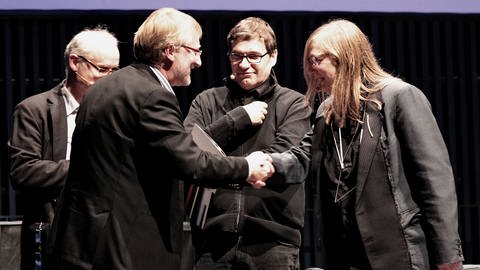
Competition 2013 and Jury Statement
This year, 68 competition entries were submitted by applicants from 18 countries. The award ceremony took place on October 20 as a public event during the Donaueschinger Musiktage 2013.
The allocation of the awards was decided by an independent jury chaired by former Minister of State for Culture, Christina Weiss, on Thursday, July 18, 2013, in Baden-Baden.
"Oswald Egger achieves with the audio piece 'Linz und Lunz' a multifaceted homage to the poet Jakob Michael Reinhold Lenz. Egger immerses himself in the linguistic and living space of Lenz, who grew up in German-speaking Livonia during the Goethe era. Egger explores the sound space of the extinct Livonian language and intertwines it with his own poetic expression.
Director Iris Drögekamp stages the polyphony of the text as a musical space of words. Three speakers and three vocal artists (Maulwerkerinnen/mouthworkers) create a polyphonic landscape of language. The audio piece opens up an unexpected space of imagination for listeners, filled with the sensuality of language and the power of words against the challenges of life. Iris Drögekamp and Oswald Egger embark on new paths of acoustic art for the radio."
About the author and the director
Oswald Egger, born in 1963 in Lana/Tscherms, South Tyrol (Italy), he studied at the University of Vienna and completed his thesis on the poetics of hermetic literature titled "Word for Word" in 1992. He lives as a writer at the Rocket Station Hombroich.
In 1996, he received a scholarship from the Akademie Schloss Solitude, followed by one at Schloß Wiepersdorf in 1999. In 2000, he was a Writer in Residence at the Chinati Foundation in Texas, and in 2001 at Villa Aurora in Los Angeles. In 2003, he was a guest professor of poetics at Cornell University in Ithaca, New York. Since 2011, he has been a professor of language and form at the Muthesius Academy of Fine Arts and Design in Kiel. From 1989 to 1998, he was the editor of the magazine 'Der Prokurist' and the 'edition per procura', and since 2003, he has been editing 'Das böhmische Dorf'. For his book publications starting in 1993, including this year's volume "Euer Lenz", he has received numerous awards: Mondsee Poetry Prize (1999), George Saiko Prize and Clemens Brentano Prize (2000), Christine Lavant Advancement Award and Advancement Prize of the City of Vienna (2001), Meran Poetry Prize and Prize for the 'Most Beautiful German Books' from the Stiftung Buchkunst (2002), Christian Wagner Prize (2006), Peter Huchel Prize (2007), H.C. Artmann Prize (2008), Oskar Pastior Prize, and again the award for the 'Most Beautiful German Book' from the Stiftung Buchkunst (2010).
Already in 2004, he received the Karl Sczuka Grant Prize from SWR for his radio production "tuning, silent", broadcasted by ORF. In 2010, he and Iris Drögekamp jointly received the Karl Sczuka Prize for the SWR radio play "Ohne Ort und Jahr" (Without Place and Year).
Iris Drögekamp, born in 1967 in Hagen/Westphalia, she studied in Hamburg and currently lives in Baden-Baden working as a radio director. Since 2007, she has also been teaching assignments in radio drama, digital media, and sound at the HfG Karlsruhe, Hochschule Darmstadt, Hochschule der Medien Stuttgart, Hochschule für Musik und Darstellende Kunst Stuttgart, and Muthesius Academy of Fine Arts and Design in Kiel.
She has received multiple awards for her numerous radio productions, including the German Audiobook Award (2006), Zons Radio Play Award (2007), RIAS Radio Award (2008), European CIVIS Radio Prize, and the German-French Journalist Prize (2012).
